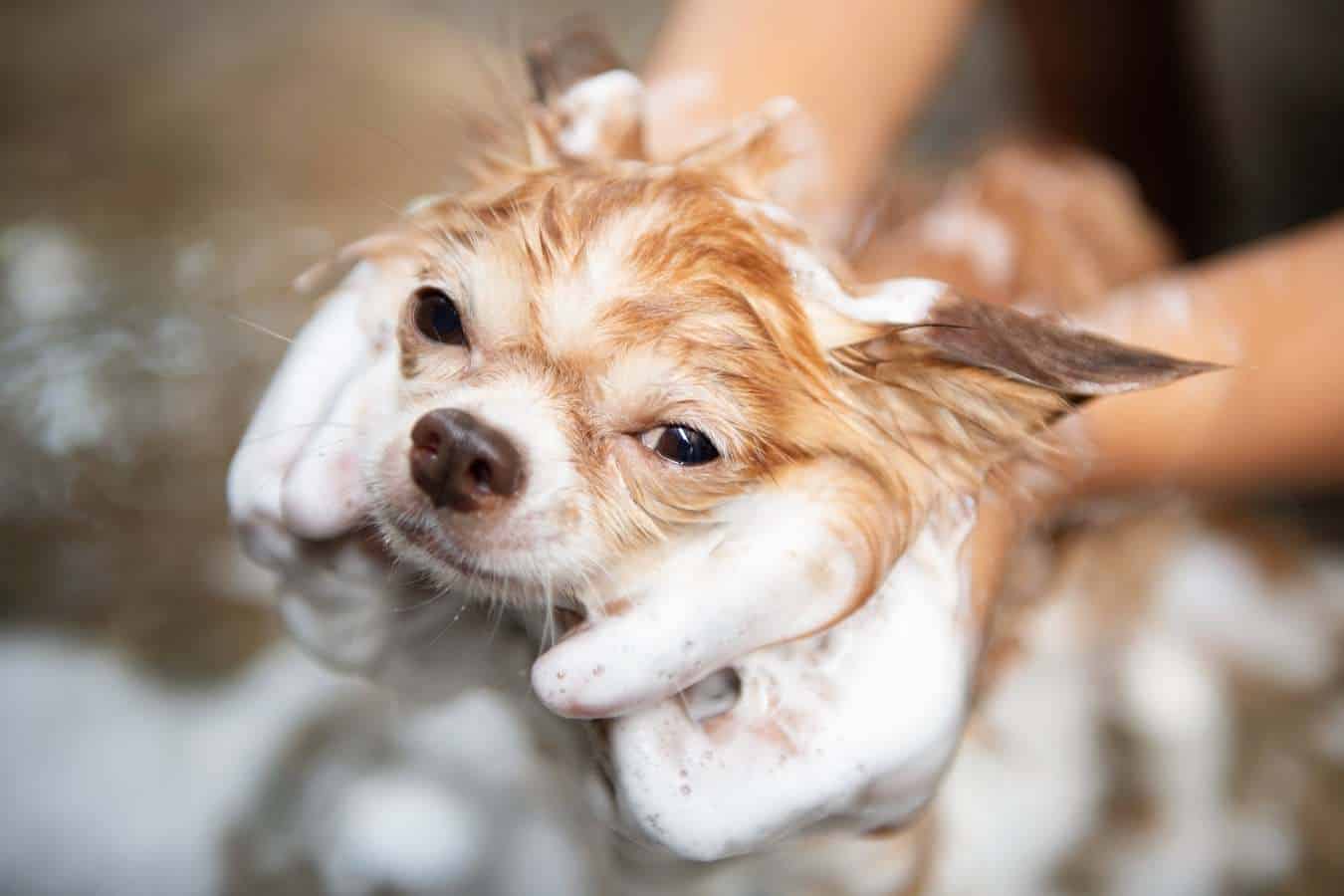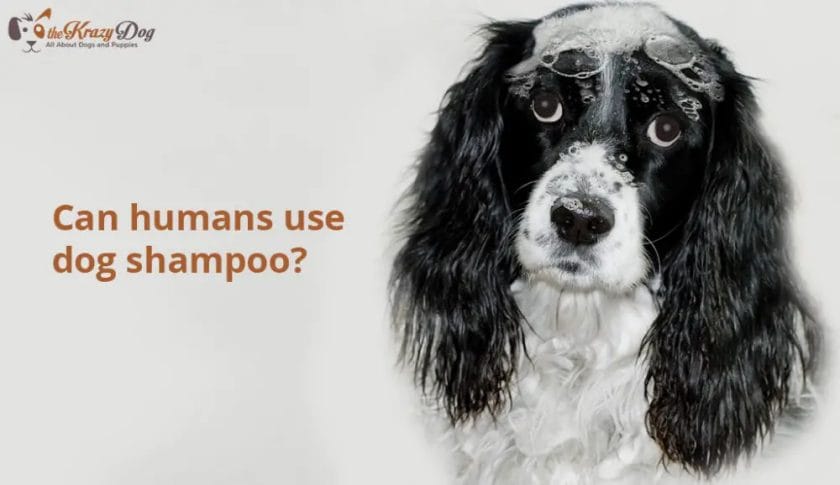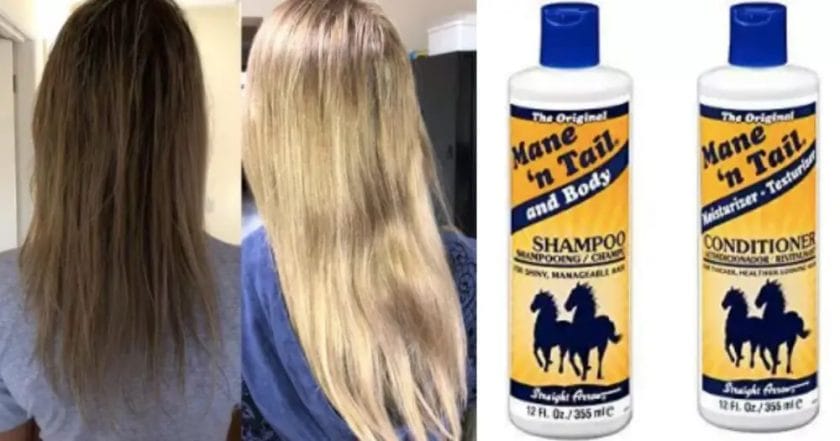If you’ve ever wondered whether you can use horse shampoo on your dog, you’re not alone. While horse shampoo may seem like a cost-effective alternative, it’s important to consider the specific needs of your furry friend.
Horse shampoo is formulated for horses’ unique skin and hair requirements, which differ from those of dogs. Using horse shampoo on your dog may lead to skin irritation, dryness, and other potential issues. It’s best to choose a shampoo formulated specifically for dogs to ensure their skin and coat stay healthy and vibrant.

Differences between Horse Shampoo and Dog Shampoo
When it comes to grooming our furry friends, using the right shampoo is essential. While horse shampoo and dog shampoo may seem similar, there are some key differences that pet owners should be aware of. In this section, we will explore the variations between horse shampoo and dog shampoo.
Ingredients
One of the main differences between horse shampoo and dog shampoo lies in their ingredients. Horse shampoo is specifically formulated for the unique needs of horses, which have a different pH level and thicker skin compared to dogs. Horse shampoos often contain ingredients such as coconut oil, aloe vera, and other moisturizing agents to maintain the health of the horse’s skin and coat.
On the other hand, dog shampoos are designed to cater to the specific needs of dogs. They may contain ingredients like oatmeal, tea tree oil, or chamomile, which are known for their soothing properties and can help alleviate common dog skin issues such as itching or dryness. Additionally, dog shampoos may have a milder pH balance compared to horse shampoos, as dogs have more sensitive skin.
Fragrance
Horse shampoos are often fragrance-free or have a mild, neutral scent. This is because horses have a highly sensitive sense of smell, and strong fragrances can be overwhelming for them. Dog shampoos, on the other hand, come in a wide range of scents specifically created to leave dogs smelling fresh and clean. Common dog shampoo fragrances include lavender, citrus, and baby powder.
Application
Due to the difference in size and coat density, the application of horse shampoo and dog shampoo also differs. Horse shampoo is typically applied using a sponge or brush to thoroughly clean the horse’s larger body surface. The lather is worked into the horse’s mane and tail as well. Dog shampoo, on the other hand, is usually applied directly to the dog’s coat, creating a gentle lather with a gentle massage, paying particular attention to areas prone to dirt and odor, such as the underbelly and paws.
Usage Frequency
Another distinction between horse shampoo and dog shampoo is the frequency of use. Horses are typically bathed less frequently than dogs, as their skin produces more natural oils and over-bathing can lead to dryness and irritation. Horse owners often use shampoo as a part of their grooming routine, and it is recommended to bathe a horse only when necessary, such as after intense exercise or exposure to dirt and sweat. Dogs, on the other hand, may require more frequent bathing, depending on their activity level, coat type, and exposure to outdoor elements.
Packaging
Lastly, the packaging of horse shampoo and dog shampoo can provide a visual clue to their intended use. Horse shampoos are typically sold in larger containers and might feature equestrian-themed branding. They are designed to accommodate the needs of larger animals and offer a longer shelf life. Dog shampoos, on the other hand, come in smaller bottles with labels and designs that specifically target dog owners. Their packaging often includes information about the specific benefits they provide for different dog breeds or coat types.
Summary
In summary, while horse shampoo and dog shampoo serve the purpose of cleansing and maintaining the health of animals’ skin and coat, there are notable differences between the two. Horse shampoo is formulated to meet the unique needs of horses, with ingredients and fragrances tailored to their sensitivities. On the other hand, dog shampoo is designed for dogs, taking into consideration their specific skin requirements and offering a variety of scents. Understanding these differences can help pet owners make informed decisions when choosing the appropriate shampoo for their furry companions.

Precautions when using horse shampoo on dogs
Using horse shampoo on dogs has become a popular practice among pet owners. Horse shampoos are often believed to be more effective in cleansing and conditioning the fur, and they may provide additional benefits for the dog’s coat. However, it is crucial to take certain precautions when using horse shampoo on dogs to ensure their safety and well-being. Here are some important considerations to keep in mind:
1. Check the ingredients:
Before using any horse shampoo on your dog, carefully review the ingredients list. Some horse shampoos contain ingredients that can be harmful or irritating to dogs. Look for shampoos that are specifically formulated for dogs or have gentle, natural ingredients that are safe for canine use.
2. Dilute the shampoo:
Horse shampoos are typically concentrated and may be too strong for a dog’s sensitive skin. To avoid any potential skin irritation or allergic reactions, dilute the shampoo according to the instructions provided. This will help ensure that the shampoo is gentler on your dog’s skin and coat.
3. Test for allergies:
Prior to using horse shampoo on your dog’s entire body, perform a patch test to check for any allergic reactions. Apply a small amount of diluted shampoo to a small area on your dog’s skin, such as the inner leg or behind the ear. Monitor the area for any signs of redness, swelling, or itching. If any adverse reactions occur, discontinue use immediately.
4. Avoid contact with eyes and ears:
When shampooing your dog, be extra cautious to avoid getting the shampoo in their eyes or ears. Horse shampoos are not designed for contact with delicate areas such as the eyes, and they can cause irritation or discomfort if they come into contact with these areas. Use a gentle, canine-specific shampoo for these sensitive areas instead.
5. Rinse thoroughly:
After shampooing your dog with horse shampoo, ensure that you rinse their coat thoroughly. Any leftover shampoo residue can cause skin irritation or dryness. Rinse the dog’s fur until the water runs clear, and gently towel dry or use a pet-friendly hairdryer on low heat to avoid overheating or discomfort.
6. Monitor for reactions:
Following the use of horse shampoo on your dog, observe their behavior and overall well-being. If you notice any signs of skin irritation, excessive scratching, redness, or changes in behavior, consult your veterinarian immediately. It’s important to address any adverse reactions promptly and appropriately to ensure your dog’s health.
7. Use sparingly:
Horse shampoos are typically designed for larger animals with thicker hair, such as horses. Using them excessively on a dog with a different coat type may strip away essential oils and lead to dryness or skin issues. Only use horse shampoo on your dog when necessary and follow up with a moisturizing conditioner to maintain the health of their coat.
8. Consider professional advice:
If you are unsure about using horse shampoo on your dog or have concerns about their specific needs, it is always best to consult with a professional groomer or veterinarian. They can provide personalized advice based on your dog’s breed, coat condition, and any underlying health concerns.
In summary, while using horse shampoo on dogs can have its benefits, it is essential to take precautions to ensure the safety and well-being of your furry friend. By carefully selecting a suitable shampoo, diluting it appropriately, performing patch tests, avoiding sensitive areas, rinsing thoroughly, monitoring for reactions, using sparingly, and seeking professional advice when needed, you can safely incorporate horse shampoo into your dog’s grooming routine.

Alternatives to Horse Shampoo for Dogs
When it comes to grooming our furry friends, finding the right shampoo is essential. While horse shampoo has been a popular choice for some dog owners, there are actually several alternatives that are specifically formulated for dogs. These alternatives offer a variety of benefits and can help keep your dog’s coat clean and healthy.
Gentle Dog Shampoo
One of the best alternatives to horse shampoo for dogs is a gentle dog shampoo. These shampoos are specifically designed for a dog’s sensitive skin, pH levels, and coat type. They are formulated to be mild and hypoallergenic, making them suitable for dogs with allergies or skin sensitivities. Look for shampoos that contain natural ingredients like oatmeal, aloe vera, or chamomile, as these can soothe and moisturize your dog’s skin.
Medicated Shampoo
If your dog has specific skin conditions or issues, a medicated shampoo may be a suitable alternative to horse shampoo. Medicated shampoos are designed to target a range of dermatological problems such as dry, itchy skin, fungal infections, or excessive shedding. They often contain ingredients like benzoyl peroxide, tea tree oil, or ketoconazole, which can help alleviate these issues. It’s important to consult with your veterinarian before using a medicated shampoo to ensure it is appropriate for your dog’s specific needs.
Natural/Organic Shampoo
For those who prefer a more natural approach, there are several natural or organic dog shampoos available. These alternatives are free from harsh chemicals, artificial fragrances, and dyes. They are often made with plant-based ingredients like coconut oil, shea butter, or lavender, which not only cleanse but also nourish and condition the coat. Natural or organic shampoos are a great choice for environmentally conscious pet owners and dogs with sensitive skin.
Waterless Shampoo
Another alternative to horse shampoo for dogs is waterless shampoo. These shampoos come in the form of sprays or foams that can be applied directly to your dog’s coat without the need for water. Waterless shampoos are convenient for quick touch-ups or for dogs who dislike bath time. They typically contain ingredients like cornstarch or baking soda, which help absorb dirt and oils. However, it’s important to note that waterless shampoos are not a substitute for regular bathing and should be used in between baths.
Coat-Specific Shampoo
Lastly, there are shampoos specifically formulated for different coat types. Whether your dog has a short coat, long coat, curly coat, or is prone to shedding, there is a shampoo designed to address their specific needs. These shampoos often contain ingredients like omega-3 fatty acids, silk proteins, or jojoba oil, which help promote a healthy coat and minimize tangles or mats. Choosing a coat-specific shampoo can help enhance the natural beauty of your dog’s fur.
Conclusion:
While horse shampoo may have been a popular choice for some dog owners in the past, there are several alternatives available that are specifically tailored to meet the needs of dogs. Gentle dog shampoos, medicated shampoos, natural/organic shampoos, waterless shampoos, and coat-specific shampoos are all great options to consider. Remember to choose a shampoo that suits your dog’s specific needs and consult with your veterinarian if you have any concerns or questions.
Choosing the right shampoo for your dog’s specific needs
As a responsible dog owner, it’s important to keep your furry friend clean and healthy. Regular bathing is an essential part of maintaining your dog’s hygiene, and choosing the right shampoo is crucial. With so many options available on the market, it can be overwhelming to determine which shampoo is best for your dog’s specific needs. In this section, we’ll guide you through the factors to consider when selecting a shampoo for your beloved pet.
1. Consider your dog’s skin type
Just like humans, dogs have different skin types that require different care. It’s essential to choose a shampoo that suits your dog’s specific skin needs to prevent irritation and maintain a healthy coat. Here are some common skin types and the corresponding shampoos:
- Normal skin: If your dog has a healthy, balanced coat, opt for a general-purpose shampoo that is gentle and won’t strip the natural oils from their skin.
- Dry skin: For dogs with dry or flaky skin, consider a moisturizing shampoo that can provide hydration and prevent further dryness.
- Oily skin: Dogs with oily skin often require a shampoo that can help regulate oil production and prevent excessive greasiness. Look for a shampoo specifically formulated for oily coats.
- Sensitive skin: If your dog has sensitive skin that is prone to allergies and irritation, choose a hypoallergenic shampoo that is free from harsh chemicals and fragrances.
2. Identify specific concerns or conditions
Aside from considering your dog’s skin type, you may also need to address specific concerns or conditions. Some shampoos are specifically formulated to target certain issues. Here are a few examples:
- Flea and tick control: If your dog is prone to fleas and ticks, consider a shampoo that contains ingredients like pyrethrin or neem oil, which can effectively repel these pests.
- Allergies: If your dog suffers from allergies, look for a shampoo that is designed to soothe and relieve itchiness. Ingredients like oatmeal or aloe vera can be beneficial for dogs with allergies.
- Medicated shampoos: If your dog has a specific skin condition such as dermatitis or fungal infections, consult with your veterinarian to find a medicated shampoo that can help alleviate their symptoms.
3. Consider your dog’s age and breed
The age and breed of your dog can also influence the type of shampoo you should choose. Puppies have more delicate skin compared to adult dogs, so it’s crucial to use a gentle, tear-free puppy shampoo. Some breeds may have specific coat requirements, such as long-haired dogs or breeds with sensitive skin. In such cases, selecting a shampoo formulated for their specific needs can help maintain their coat’s health and appearance.
4. Read ingredient labels
When selecting a shampoo for your dog, it’s essential to read the ingredient labels carefully. Avoid shampoos that contain harsh chemicals, artificial fragrances, or dyes, as these can irritate your dog’s skin. Look for natural, organic ingredients that are gentle and safe for your furry friend.
5. Seek recommendations and reviews
Lastly, don’t hesitate to seek recommendations from your veterinarian or fellow dog owners. They may have valuable insights and recommendations based on their experience with different shampoos. Additionally, reading online reviews can provide you with a broader perspective on the efficacy and suitability of various dog shampoos.
In summary, choosing the right shampoo for your dog’s specific needs involves considering their skin type, addressing specific concerns or conditions, and taking into account their age and breed. By carefully selecting a shampoo that suits your dog, you can ensure that their coat remains clean, healthy, and free from irritation.
Frequently Asked Questions (FAQs)
Can I use horse shampoo on my dog?
No, it is not recommended to use horse shampoo on your dog. Horse shampoos are formulated specifically for horses and may contain ingredients that can be harmful or irritating to dogs. It is best to use shampoos that are specifically designed for dogs to maintain their skin and coat health.
How often should I bathe my dog?
The frequency of bathing your dog depends on several factors such as their breed, coat type, activity level, and any skin conditions they may have. In general, most dogs benefit from bathing once every 4-6 weeks. Over-bathing can strip natural oils from their skin, so it’s important to find a balance that works for your dog.
What should I do if my dog has dry skin?
If your dog has dry skin, it is important to identify the underlying cause. Dry skin can be caused by factors such as allergies, parasites, or environmental conditions. Consult with your veterinarian to determine the cause and develop a treatment plan, which may include dietary changes, moisturizing shampoos, or medication.
Conclusion:
In conclusion, while it may seem tempting to use horse shampoo on your dog, it is not recommended. Although horse shampoo may have similar ingredients to dog shampoo, the formulations are specifically designed for different animals. Dogs have different pH levels and skin sensitivities compared to horses, so using horse shampoo on your dog may cause skin irritation or other adverse reactions.
Furthermore, there are numerous dog-specific shampoos available in the market that cater to the specific needs of your furry friend. These shampoos are specially formulated to cleanse and nourish a dog’s coat, leaving it healthy and shiny. It is always best to consult with a veterinarian to determine the most suitable shampoo for your dog’s individual needs.
Remember, your dog’s well-being and comfort should always be the top priority, so choose products that are specifically made for dogs.
